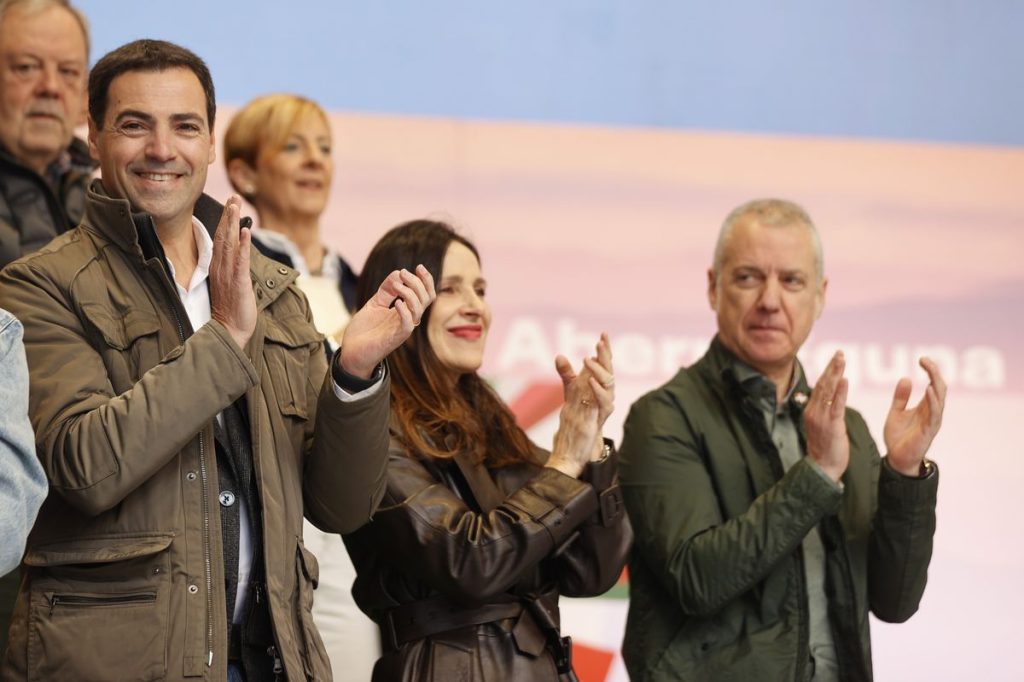Less than five days remain before the start of the campaign for the Basque elections on April 21, which are the closest that have been seen according to polls. The run-up to the elections coincided with the annual celebration of Basque National Day, Aberri Eguna, where parties took the opportunity to assert themselves before the upcoming election. The president of the PNV, Andoni Ortuzar, urged his members to “mobilize the vote to the fullest” and suggested that EH Bildu has hidden agenda with true intentions that will be put into action if they come into power. Ortuzar acknowledged that the competition is tight, as polls predict a technical tie with EH Bildu, but he expressed confidence that the PNV will win the election. The focus of the election, he stressed, is on the response of the Basque institutions to ensure progress and welfare.
Urkullu, the Basque president, listed the achievements of the PNV in leading the Basque institutions, highlighting that Euskadi currently has more nationhood, autonomy, and well-being due to their governance. He criticized those who seek to destabilize and promote a constant confrontation. His successor, Imanol Pradales, emphasized the choice between two models – one for improvement and the other for decline. Referring to EH Bildu without naming them directly, Pradales stated that the PNV resolves issues without creating new problems or burdening the people. The survey by 40dB for EL PAÍS and Cadena SER shows that both PNV and EH Bildu are tied with 28 seats each, but the PNV holds a slight lead in voting intention: 34.2% versus 33.7% for EH Bildu, a scenario unimaginable twenty years ago.
EH Bildu celebrated the Aberri Eguna in Pamplona with a massive demonstration and a political event where the party’s general coordinator, Arnaldo Otegi, warned that independence will not come without first achieving power. The march, led by a banner reading “We are a nation,” had around 15,000 participants, including representatives from ERC and BNG. Otegi emphasized the need to show through action that the country has a national project that is ahead in Europe in social rights, health, education, environmental protection, and wealth distribution. The goal is to reach power and demonstrate a sovereign, independent, and Basque republic.
The president of the Basque PP and candidate for lehendakari, Javier de Andrés, criticized the PNV’s views expressed on Aberri Eguna, stating that the party is moving further away from the open Basque society needed by the people. The national leader of the PP, Carmen Fúnez, claimed that Pedro Sánchez is the “biggest guarantee for whitewashing Bildu and strengthening independence” in Spain. She pointed out a contradiction in the celebration of Aberri Eguna in Pamplona, a city governed by Otegi’s party with the support of the PSOE. This was seen as a reflection of Sánchez’s management, which is seen as supporting the whitewashing of Bildu and the strengthening of independence.
In the final days leading up to the Basque elections, tension is growing as the PNV and EH Bildu are neck and neck in the polls. Both parties are making their case to voters, emphasizing their vision for the future of the Basque Country. The outcome of the election will not only determine the next government but also set the direction for the region in terms of progress and welfare. The celebration of Aberri Eguna has served as a platform for parties to rally their supporters and present their platforms, highlighting the importance of the upcoming election in shaping the future of the Basque Country.














